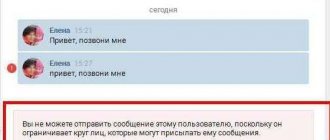Social networks, no matter what they say about them, are an excellent means of communication. They allow you to connect not only with friends, but also with other people outside your personal circle of acquaintances. To do this, you can use any device: mobile phone, computer, laptop, tablet and even new TVs with an operating system. The most popular social network in the Russian segment of the Internet is VKontakte. The main means of communication here is regular messages. But sometimes users encounter the following notification: sending messages is limited. You can find out what this means in VK by reading this article.
Why does such a message appear on VK, and what does it mean?
The most common reasons for message blocking.
| Black list | This function can be used by absolutely every member of the social network. Perhaps you upset your friend, and he, not wanting to receive messages from you, added your page to this list. You can contact him in another way and clarify this |
| You are not a friend to the person you are writing to. | Each registered VK user has the right to limit incoming messages from strangers. Today, social networks are especially crowded with fake pages, as well as accounts of various organizations. Therefore, very often they write to us privately with the goal of offering services and goods that are completely unnecessary to us. |
This is interesting: how to see who a friend added on VKontakte.
Blocking messages from a person on VKontakte
One of the main features of the VKontakte social network is sending messages to other users for the purpose of communication. And although this is implemented quite conveniently, sometimes it becomes necessary to block incoming messages from a specific person on a temporary or permanent basis. During this instruction, we will tell you exactly how you can block messages from any user.
How to close access to strangers on VKontakte
If you do not want to block access to messages from everyone, then you can use the blacklist.
You can find it in the account settings of each VK profile:
- Select the arrow with your mouse, which is located at the top right of the page, near the thumbnail of your avatar;
- Click "Settings";
- In the block on the right, select “Black List”;
- A window will open where you can add any social network member to this list;
- To add, click the blue “Add...” button. You will see a list of your friends, as well as a user search bar. To add, just click on the “Block” button next to the one you want.
After this, the blocked profile will not be able to contact you in any way. You can select “All”. In this case, no user (except the administration) will be able to write to you.
You can also refuse to receive messages in another way. For this you also need settings.
But now in the block, select not the black list, but the “Privacy” item:
- Now lower the window below and find the “Contact me” block;
- Select the value opposite “Who can write...” and set it to “Only friends”;
- In the same block, you can block offers to play games and notifications about joining groups;
- There is no need to confirm the settings; they are saved automatically after selection. You will see a notification after setting the value.
After this, no one will be able to write to you except your friends. You can change this setting at any time in this section. By clicking on the value, you can select “All except...”. So this function will be the same as the blacklist function. You can block individual members, even from your friends list. And users will see that sending messages is limited on the VK page.
This may be useful: how to allow access to the microphone in VK.
“Russian people's messenger” is under threat: users are afraid of censorship on WhatsApp
On January 8, WhatsApp users began receiving notifications with new rules for using the service: they must be accepted by February 8, 2021 in order to continue working in the messenger; those who disagree will be blocked (with the right, if desired, to delete their account). The main change in the rules: the site now has the right to exchange information about users with other services in the Facebook ecosystem.
“The information we share with other Facebook companies includes registration data associated with your account (such as your phone number), transaction data, service-related data, including how users (including companies) interact with our services, information about users’ mobile devices, IP addresses, etc.” - says the messenger system message. The new privacy rules mean that WhatsApp user data will be used "to improve infrastructure and delivery systems, analyze how the company's services are used, help ensure the security and integrity of Facebook products, and more."
It is officially reported that the main goal of such an upgrade is closer integration of the entire Facebook ecosystem. It is worth noting that if Facebook as a social network has not become “popular” in Russia, then two other key elements of the ecosystem - the WhatsApp messenger and the Instagram photo-video blogging service - have become indispensable elements of everyday life both in Moscow and in the regions. In particular, WhatsApp and Insta are the largest trading platforms; group chats in the “green” messenger have become the standard for this kind of tools almost everywhere, and Instagram has also turned out to be a platform for public blogs of officials. They are used without thinking about the ownership of Facebook platforms, a transnational corporation with American roots and living under US law. However, new rules may force a rethink of daily practices.
“We have given up actively maintaining Facebook as a “business card” for about three years now,” says Nikolai T., owner of a Moscow antique online store. “This happened after the platform’s algorithms began to find fault with the nature of the items being sold. We were blocked several times for content that did not comply with community standards: it was about selling vintage products made from natural fur and ivory. The fact that these things are many decades old, that at the time of their release such production was completely legal, and the circulation of second-hand items made from these materials is not limited - these arguments did not work, our posts were simply deleted and blocked, without entering into correspondence. Now I’m afraid that the same thing awaits us on WhatsApp. Fortunately, robots for complete content analysis of correspondence are not science fiction, but reality.
Indeed, it is already impossible to share some links (usually to competing sites) in Facebook’s own messenger. And WhatsApp - which has been actively developing as a trading platform in the past year - is now limiting the system's "broadcast" capabilities: last year, it became possible to forward "frequently forwarded messages" to only one person at a time. The administration of the messenger stated that this was done in order to combat disinformation. However, messages are often given the status of “doubtful” or “untrustworthy” on “mother” Facebook only because they do not comply with the guidelines of the site itself. This was most clearly manifested in 2021 during the fight against Covid-dissident posts, but also affects other - most often political - statements, for example, in support of the outgoing US President Donald Trump.
At the same time, the most popular messenger in Russia also found itself under the suspicion of the state - as a kind of “foreign agent platform.” In the last days of 2021, a number of media outlets, in particular, disseminated information that it was through WhatsApp that the work of the Special Purpose Center for Traffic Safety (TsSN Traffic Safety) of the State Traffic Safety Inspectorate was coordinated. Almost immediately after this news - in the first days of 2021 - it became known that the head of the Moscow State Traffic Safety Inspectorate, presumably responsible for choosing a working channel so vulnerable for a transnational corporation, had left his post.
“The system is terribly leaky and without any Americans,” agrees Alexey K., system administrator of one of the departments of the capital’s mayor’s office. — There is no proper encryption, the work is tied to phones, it is impossible to send self-destructing messages. Whatsapp has only one, but decisive, advantage: it is truly a people's messenger; all employees have it to call their aunt in Lipetsk or their mother in Rostov. That’s why it wasn’t easy for us to switch to another messenger several years ago: people whined that they didn’t want to have a “zoo” of applications on their phones. We had to insist, and since 2021 we have all been working on a different site - we continued even when it had problems with Roskomnadzor, because it is more convenient and safer.
The idea of completely banning the use of the “green” messenger by civil servants has been in the air for several years: for example, in September 2016, it was reported that the Federal Security Service plans to fire its employees for working on WhatsApp. German authorities do not recommend officials and politicians use this application, and in the United States antitrust lawsuits have been filed against Facebook - the Federal Trade Commission (FTC) believes that the ownership of WhatsApp and Instagram provides the corporation with a “dominant position in the social networking segment.” A similar state struggle in the United States is going on with another global ecosystem - Google, which is also accused of violating antitrust rules. Thus, large IT platforms, also known as ecosystems, are already recognized by states as a powerful force that must either be brought under control or neutralized. Intellectuals have been talking about this since the first years of the 21st century, while the moment of consumer inertia of the vast majority of users plays on the side of corporations. It is still unclear who will be the winner in this situation.
In what cases does a restriction notice appear?
Not everyone knows that you can send messages to non-friends on VKontakte only 20 times a day to a specific user. This restriction allows you to limit spam from profiles that distribute unnecessary advertising. When the user tries to send the 21st message, he will see a notification about sending restrictions.
For friends, the message blocking setting works a little differently. If you have restricted someone from sending you messages, and this user is on your friends list, then he can do this for another week. After this period, your restriction will begin to apply. A bit of a strange rule, but nothing can be done.
Causes of the error “Sorry, you can only send messages to mutual contacts”
This problem can be easily diagnosed. When you try to send a message to someone on Telegram, you see this notification:
At the same time, you can continue to send messages to mutual contacts - that is, those who have your phone number in their contacts and you have his phone number in your list. These contacts are called mutual. In addition, you can send messages to those who messaged you first. But you cannot start a dialogue with a contact that is NOT mutual.
You may be interested in: What do the checkmarks in Whatsapp and Viber mean in messages?
How to send a message despite being blocked
The easiest way to send a message to a user on VK who has limited the circle of people who can write to him is to simply add him as a friend. When he accepts your application, you will be able to contact him in any way that VKontakte provides. In other cases, for example if a user has blacklisted you, you will not be able to bypass this
Various resources on the Internet may claim that there are special applications for this that will help bypass this limitation. You will be asked for personal information and confirmation of permission to access your page. After such services, users lose their accounts. Therefore, you should not trust scammers. Try to solve this problem yourself. You can use other means of communication and convince the user to remove the restriction on sending messages on VKontakte. After this, you will stop receiving the “Message sending is limited” notification in VK.
What to do? How to write if messages are closed?
You can't write directly, but there are other options.
Contact via group
If you are both in a group, try to find his comments there and write through the “Reply” button.
For example, write this:
Open a personal message, please.
Then he will see a notification about the answer and guess that they want to write to him in a personal message and cannot do it.
Add as Friend
Try adding the person as a friend. He may have changed his settings so that only friends can write to him. Go to his page and click “Add as friend”.
In this case, you can attach a message in which you write the reason - for example,
“Your personal account is closed.
Please open or add as a friend." If he sees your application, he will react somehow (if he considers it necessary).
Contact a person through his friends
Go to the person's page and look at his friends list. If there is anyone among them whom you know, then write to him and politely ask him to pass on your message.
Contact in another way
If you really need to contact a person, but there’s no way to contact them via VK, then call them or write an SMS. If you don’t know the number, try to find it out through mutual friends. You can also look for him on other social networks and write to him there - instructions: Find a person on the Internet, on social networks.
Unblocking your Telegram account
If, when sending, you see the notification “Unfortunately, at the moment you can only send messages to mutual contacts,” then you can take two ways to solve the problem, and they depend on why you were blocked.
Main reasons:
- You can be blocked fairly if you actually sent spam to people.
- You may be blocked unfairly if you did not send any spam.
Below we will look at what these solutions are in Telegram.
Why can they “Report Spam” in Messenger?
As mentioned above, the content of the message does not matter, and you can be reported as spam for any text, image or video. As a rule, most people do not want to communicate with strangers, and the “Block” button is in a very visible place. So visible that sometimes you can click on it even completely by accident. Therefore, the likelihood of ending up in spam when contacting a non-reciprocal contact is very high.
But if you send any links, an offer to promote something, buy something, shock content, an invitation to join a group and similar things, then the probability of ending up in spam is close to 100%. Certainly none of the audience members like this.
A way to remove restrictions if spam was not sent to your contacts
This also happens, and this can happen for three reasons:
- There is a bug in Telegram's security algorithms. Unfortunately, this is possible, and no matter how perfect the algorithm is, there is a certain probability of errors.
- You purchased a new phone number, and the previous owner was sending spam.
- You are registered with a virtual or VOIP phone number.
In these cases, you also need to contact the bot, as written above. Follow the link https://tele.gs/SpamBot or search for the bot @SpamBot. Click "Start" and you will see the blocking date. If you did not send spam and are firmly convinced that the blocking is not fair, then through this bot you can send a complaint about this event. Telegram employees will process and check it in the next few hours, and if you are really right, they will remove the blocking.
It often happens that the blocking is discovered when purchasing a new number - you never know who it belonged to and what its previous owner did. By the way, even if the previous owner of the number deleted a Telegram account blocked for spam, and the new owner later activated it again, the blocking will still remain. In this case, the issue is also resolved through the above bot.
This may be useful: What does the upside down smiley emoji mean?











